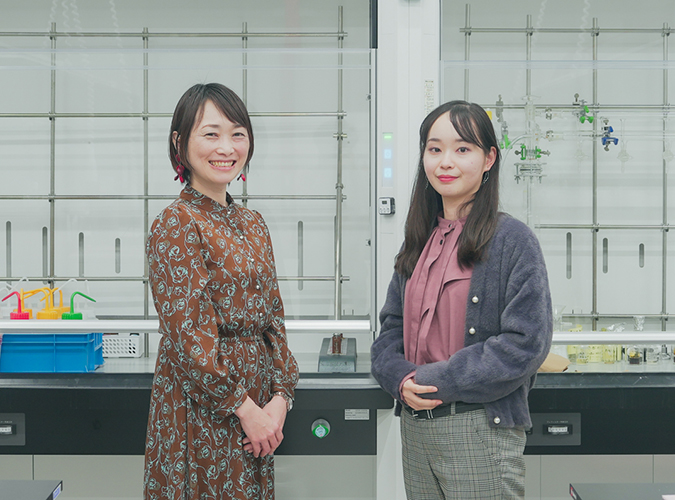150周年記念企画
「未来を拓く青学マインド」
人とつながり、
世界に貢献する
研究者
|教員・学生|
理工学部 化学・生命科学科教授
長谷川 美貴
×
理工学部 化学・生命科学科 3年
水田 優里/高瀬 さちか
2024年11月に創立150周年を迎える青山学院。150年の歴史の中で数多くの卒業生がさまざまな分野で活躍しています。今回は、青山学院大学卒業生でもある理工学部化学・生命科学科の長谷川美貴教授と、研究者を目指す水田優里さん、高瀬さちかさんが、研究者としての心得や研究のやりがい、青学の魅力について語り合いました。
Profile
長谷川 美貴
理工学部 化学・生命科学科教授

青山学院大学理工学部化学科卒業、同大学院理工学研究科化学専攻博士後期課程修了。レアアース*を光らせる分子をつくること、発光の原理を明らかにすることを目的に29年間レアアースを研究。2023年「令和5年度日本希土類学会賞(塩川賞)」を受賞。休日は読書や音楽・ミュージカル鑑賞、家族とのスポーツなど、リフレッシュの時間を大切にしている。
*レアアース
希土類とも呼ばれる17種類ある金属元素群。産出量が少なく抽出が難しいため、その性質には未知の部分も多い。スマートフォンや電子機器など多くの物に使われている。

理工学部 化学・生命科学科 3年
水田 優里
神奈川県私立清泉女学院高等学校出身
高校の時に化学を学び、化学が暮らしのさまざまなことに生かされていることに気付き、多様な視点で化学を学びたいと進学。幼い頃から命について考える経験をし、医療と化学を結ぶ研究に興味がある。3年間、相模原祭の実行委員を務め、他学部の仲間とともに目標に向かって協力し合う経験ができた。

理工学部 化学・生命科学科 3年
高瀬 さちか
神奈川県私立洗足学園高等学校出身
化学と生物の両方の領域にまたがる研究に関心があり進学。英検取得やTOEIC受験を通して英語力向上に努めており、海外とつながり研究開発を進めていくことに興味がある。相模原祭の実行委員として3年間対外部に所属。協賛企業との折衝を担当し、3年次は対外部長を務めた。
TALK THEME
1st TALK
「青学の魅力はどんなところ?」
「世界に開かれた学びの環境は、
世界中の研究者と共同研究を
進める私の土台です」

今日は、研究者を志望する私たちが、長谷川先生に研究者の心得などをお尋ねしたいと思います。その前に、私が青学の理工学部化学・生命科学科に進学した理由をお話しします。高校時代に化学を学び、化学分野が人の生活や命をささえていることを知って化学をより深く学びたいと思いました。この学科は、1年次から有機化学、無機化学、分析化学、物理化学、生命科学の5分野を幅広く学ぶことができるので、自分の可能性を広げられると考えました。広大で芝生のきれいなキャンパスにも惹かれました。高瀬さんはどうですか。

水田さん
私は化学を使って生物領域の研究をしたいと思い、化学と生命科学、どちらも学べることを魅力に感じて進学しました。また、研究施設が充実している点も素晴らしいと思いました。

高瀬さん

長谷川先生
水田さんと高瀬さんは高校の時から学びについてとてもよく考えていたのですね。確かに本学は、機器分析センターなど大型の実験機器やそれらを維持する仕組みなど、研究環境が充実しています。ハード面だけでなく、機材を教員や学生が安全にスムーズに使えるよう指導やメンテナンスを行うプロフェッショナルがいて、設備を有効活用できることも特長だと思います。
また本学独自の全学共通教育システム「
青山スタンダード」が特にお薦めです。将来必要な教養や技能を身に付けられる全学共通のカリキュラムで、教員としても、他学部の学生の反応や意⾒にハッと気づかされることもあり、勉強になります。
私も、他学部の先生の講義や学生の意見は、理工学部とは違う視点や雰囲気があって興味深く感じます。

水田さん
法学など、学部では学べないけれど社会に出た時に基礎知識になるものを学べています。長谷川先生も青学のご出身ですが、どうして青学を選ばれたのですか。

高瀬さん

長谷川先生
世界に開かれた大学というイメージがあり、世界中の人と交流したいと考えて本学への進学を志望しました。実際には、今ほど留学生は多くいませんでしたが、一度、博士課程の学生の頃、国際政治経済学部の先⽣から青山キャンパスで、国連事務総長にお目にかかる機会をいただきました。理工学部の代表として選ばれ、他学部の代表の学生たちと共に、世界の諸問題についてグループワークを行って事務総長に質問をしました。その過程で分野の異なる人に伝える難しさや大切さを学びました。最近では私は、世界のさまざまな国の研究者と共同研究しており、留学生を受け入れてもいますが、その時の経験が今の土台になっていると感じています。
2nd TALK
「研究者として大切な資質とは?」
「何かうまくいかないことが
あっても、
そのうち何とかなる。
スランプとは思わない」

まだまだ学ばなければいけないことが多く、将来、自分の力で研究に取り組めるようになれるかどうか不安に思うことがあります。

水田さん

長谷川先生
そうですね。いろいろ不安はあると思います。水田さんと高瀬さんは、今年の夏に「将来研究をしたいと思うけれど迷っている」と相談に来てくれましたね。今はどんなことを考えていますか。
果たして自分に研究ができるのか、不安に思っていましたが「悩むくらいなら気楽に進学してみたら?」とおっしゃっていただいて、「学部で4年学んだ後にも大学院で学び続けたい、研究で貢献したい」という思いが強くなりました。今のところは、光を用いた病気の治療法や医薬品における光反応などに興味がありますが、4年次からどの研究室に所属するかについてはまだ迷っています。

水田さん
長谷川先生は、講義の中で世界中の研究者との交流についてよくお話をしてくださいますよね。研究に興味がありましたが、ラボに閉じこもってひたすら実験をするのは自分には向かないと思っていたところ、研究を通じて世界と交流される姿を拝見し、研究者を志すことにしました。長谷川先生の研究室の、細胞の中にレアアースを組み入れて評価を行う材料として使う研究に関心を持っています。

高瀬さん

長谷川先生
ありがとうございます。楽しみです。私が学生の頃はただただ研究が面白く、同時に7つの研究テーマを抱えるなど、やりたいことをとにかく実行していました。それを容認してくれていた恩師にも恵まれていましたし。それでも当初は「研究者になろう」という目的を持っていませんでした。お二人とも将来のことまでしっかり考えていて本当に素晴らしいと思います。
4年次に研究室に配属されて、ちょうど研究が面白くなってきたところで卒業となってしまうことも多いので、迷っているという人にはまず大学院進学を勧めています。ご家族の理解も含めて進学できる環境を整えることも必要ですよね。自分が興味あるテーマに時間をかけて取り組み、自分で道筋を立てて考察し、失敗もしつつそれを乗り越えながら進んでいく研究活動での経験は、どのような職業に就いても生かされる経験です。これは文系も理系も共通だと思います。
長谷川先生は長年レアアースの研究をされていますが、私の場合、自分が研究者になった時に、一つの課題にずっと取り組み続けられるかどうか心配です。

高瀬さん

長谷川先生
うーん、私は実は飽きっぽいしせっかち?なんですよ(笑)。
え、そうなんですか?

高瀬さん
それでも研究を続けられるのですか?

水田さん

長谷川先生
むしろ、だから続けられるのだと思います。一つのテーマといっても、研究を進めていると、解決しなくてはならない細かい課題がたくさん出てくるものです。いろいろな方面に枝葉が伸びて広がっていくようなイメージですね。課題や解決しないと前に進まない問題が出てきた時、大切なのは原因や解決要素の可能性を数多く挙げられること。一つのことだけに没頭するよりもいろいろなことに興味を持てると有利です。研究の道を志すなら、仮説を多様に立てる訓練もすると良いですよ。
仮説を立てても思うような結果が出ない、課題がなかなか解決しないなど、スランプに陥ることもあると思いますが、そこから脱出する力はどうやって養ったらよいのでしょうか。

水田さん

長谷川先生
これも難しい質問ですね。ある一つのテーマの中でも課題やクエスチョンは多様で、一方の問題が解決しても、新たな問題がまたやってきます。どうしてもうまくいかない時には、「今は仕方がない。けれども、そのうち何かわかるかもしれない。」と頭を切り換えて、他の課題に取り組むようにしています。実は私は、何かうまくいかないことがあっても「スランプ」ととらえたことが⼀度もありませんでした。
研究とは大きな成果を出すものだと思うかもしれませんが、例えば卒業論文を書く時、何か大きな発見がなければいけないわけではありません。筋道を立てて、できたところまでを「これではうまくいかなかった」ということも含めてきちんと説明できればOKなのです。その結果を踏まえてまた別の機会に取り組むこともできますし、他の誰かがその結果を使って更に研究を進めることもできます。
3rd TALK
「研究のやりがいはどこにある?」
「発⾒することへのわくわく感、
科学技術の発展に貢献できること、
世界中の人とつながれること」


長谷川先生
不安もたくさんあると思いますが、お二人の研究への夢をぜひ教えてください。
私は、小さい頃に病気にかかったことや、身近な人の死を経験したことから、命についていつも考えてきました。化学や生命科学の研究で、病気の人やその家族を助けられるのではないか、皆がハッピーになれる世界をつくれるのではないかと思っています。

水田さん
私も、化学の力を人の命を救うことや病気を治すことに役立てたい、という夢があります。入学当初は、研究と社会のつながりに具体的なイメージを持てなかったのですが、学科の講義で先生方の研究のお話を聞き、「こういう研究がこうして社会に役立つんだ」という道筋が見えてきて、私もそのように貢献したいと思うようになりました。先生はどのようなところに研究のやりがいを感じていらっしゃいますか?

高瀬さん

長谷川先生
大学は、社会に⽻ばたく⼈の教育の場で、研究だけでなく教育にもやりがいを感じます。研究室に配属された時に少し頼りなかった学生も、一つの研究テーマを究めて論文を完成させると顔つきもきりりと変わってきます。社会で活躍できる学生を送り出せることは、この仕事をやっていて嬉しいことの一つです。研究そのものでいえば、誰も知らなかったことを発見した時、複数のテーマがつながって一気に真実が見えた時は、本当にわくわくする瞬間です。さらに、それを論文や特許にまとめて世界に発信することで、将来の科学技術の発展や人々の暮らしに貢献できることは研究の醍醐味です。
研究を通して、世界中の人とつながれることもこの仕事の醍醐味ですね。研究論文は世界とのコミュニケーションの第一歩です。論文を通して知り合った研究者と、国際会議で顔を合わせてさらに交流が広がっていくと、研究の幅も広がります。今、私の共同研究者にも、戦争や紛争の影響で研究が続けられないどころか命の危険にさらされている状況の人がいます。日本が平和であることはありがたいことだと実感しています。すべての国や地域でそういうことがなくなるよう、間接的にでも世界の皆で協力しあっていきたいと思っています。海外の研究者や学生を受け入れる時は、同じ空間でお互いが気持ちよく研究できるよう、なるべくその国や地域の習慣をこちらが理解して研究環境を整えるような工夫も心がけています。
私は英語が好きで、日頃から英語学習にも力を入れています。将来、世界中の人とつながれるのが楽しみです。

高瀬さん
今まで、人とのつながりという点から研究を捉えてはいなかったので、今後考えていきたいと思います。

水田さん

長谷川先生
高瀬さんも水田さんも、研究を通して人への貢献をしたいと話してくれましたね。十分考えていると思いますよ。これは本学が建学以来大切にしている「サーバント・リーダー*」の育成にもつながります。サーバント・リーダーを目指すために何か考えていることはありますか。
*サーバント・リーダー・・・青山学院のスクール・モットー「地の塩、世の光」の精神を体現しながら、自分の使命を見出して進んで人と社会とに仕え、その生き方が導きとなる人。青山学院は、すべての人と社会のために未来を拓くサーバント・リーダーを育成している。
今日の先生のお話を通して、人とのつながりが大切だとよくわかりました。多くの人と関わり、他者の考えにふれる経験をして、人に寄り添える研究者になりたいと思います。

水田さん
人と社会に仕えるという意味では、常に高い志を持つことが大切だと思います。現状に満足することなく、研究をしていきたいと思います。

高瀬さん

長谷川先生
頼もしい意見ですね。私は、⾃⾝がサーバント・リーダーとしての⾏動を意識していますが、それ以上に常に笑顔でいることを心がけています。研究においても、研究室のマネジメントにおいても、日々、いろいろなことが起こります。私が尊敬する「この人のように生きたい」と思える人たちの共通点は、良い時も辛い時も笑顔を絶やさないというところ。困難があっても、リーダーが笑顔でいると、チーム全体もそれに引っ張られるように粘り強くなり、ラッキーやハッピーを引き寄せられると本で読んだこともありますし、実際そういう経験がいくつもありました。
今日は研究者という夢に向かうお二人の話を聞けてとても楽しかったです。女性の研究者は、まだ少ないのが現状ですが、学会会場の中に託児所が設けられる等、環境が整備されつつあります。女性であることを理由にやりたいことを諦めることはありません。徐々に整ってきた社会のサポート体制を活用しながら、夢の実現に向けて力強く邁進してください。
ありがとうございました。

水田さん

高瀬さん


After Interview
研究者という夢に向かい、二人は長谷川先生との対話をどのように生かしていく?

幅広い分野にアンテナを張るようにしたい
エネルギッシュに話されていた先生の姿や「そもそもスランプだと思わない」という発想、世界で活躍する研究者としての数多くのご経験など、たくさんのお話が印象に残っています。今回の対談で、青学に入学して良かったと一層実感しました。長谷川先生のような素晴らしい先生と出会い、学ぶ機会がある環境に感謝し、多くの人にいつか恩返しをしたいです。先生のお話をヒントに、幅広い分野のことにアンテナを張っておくことを今のうちから意識しようと思いました。日常的に幅広い気付きを得ることが、良い学び・研究につながると思います。(水田)

人の縁に感謝し大胆な挑戦もしていきたい
研究のお話をされている長谷川先生はとても楽しそうで輝いていて、情熱が伝わってきました。私も情熱を持って研究に取り組む研究者を目指します。国連事務総長に会ったり、一人で多くのもの研究テーマを抱えたり、先生の学生時代の多様な経験をうかがい、大胆な挑戦を心がけることも大切だと思いました。また、好奇心と人との縁を大切にされていることも印象に残っています。改めて周りの人との縁をこれからも大切にしていこうと思うと同時に、尊敬できる先生方や友達に出会えた青学での大学生活にも感謝したいと感じています。(高瀬)
Side Note
青山学院大学の大学院生への主な支援体制
本学の大学院理工学研究科では、学内進学の成績上位者への授業料の全額または半額を給付する奨学金制度などを取り入れ、大学院への入学者数が増加しています。理工学部では大学院への学内進学率が2022年度は約44%となり、併せて大学院生がTA(ティーチング・アシスタント)として学部生の学びをサポートしてすることで、学部生とTAがともに向上する好循環を生んでいます。また本学の大学院では、研究を支えるさまざまなサポートを用意しています。博士後期課程入学者、一貫制博士課程3年次進級者の授業料の実質無料化(施設設備料等は別途必要)を図る「若手研究者育成奨学金」、国際学会参加支援、若手研究者支援する「 アーリーイーグル研究支援制度」、JSTの助成を受け優れた博士課程の学生を育成する「AGU Future Eagle Project(略称FEP)」などのバックアップ体制を整えています。
大学院生の支援制度 | 青山学院大学 (aoyama.ac.jp)
青山学院大学の研究最前線 | AGU NEWS (aoyama.ac.jp)
| 支援策 | AGU Future Eagle | 大学院生への主な支援制度 |
|---|---|---|
| 奨学金 | 若手研究者育成奨学金 | |
| 博士後期課程の標準修業年限、一貫制博士課程の3年次〜5年次(3年間)の授業料を実質無償化 ※FEP学生にも適用 |
||
| 生活費 | 研究奨励費等 月額18万円 |
院生助手制度 |
| 博士後期課程や一貫制博士課程3年次以上の大学院生を院生助手として雇用し、研究を優先しつつ、学部生の講義や実習、 国際会議の運営など、高度な補佐業務を行う制度 研究に従事しながら、学部生の講義や実習の補佐業務を行う制度 給与月額 16万円(雇用は通算3年まで) ※FEP学生は併用不可(転換を望む場合は要相談) |
||
| 生活費 | 研究奨励費 研究費25万円/年 |
アーリーイーグル研究支援(若手研究者支援)制度 |
| 博士後期課程学生、助手、助教ら 若手研究者向け学内競争的研究費 博士後期課程学生支援金額 25万円、12件/年 ※FEP学生は併用可 |
||
| 国際学会参加推進 年1回の参加補助 |
国際学会発表支援制度 | |
| 博士前期・後期課程学生を対象とした国際学会発表渡航費支援制度 国内開催 7万円まで、国外開催 15万円まで ※FEP学生は併用可(国際学会参加 2回目) |





















